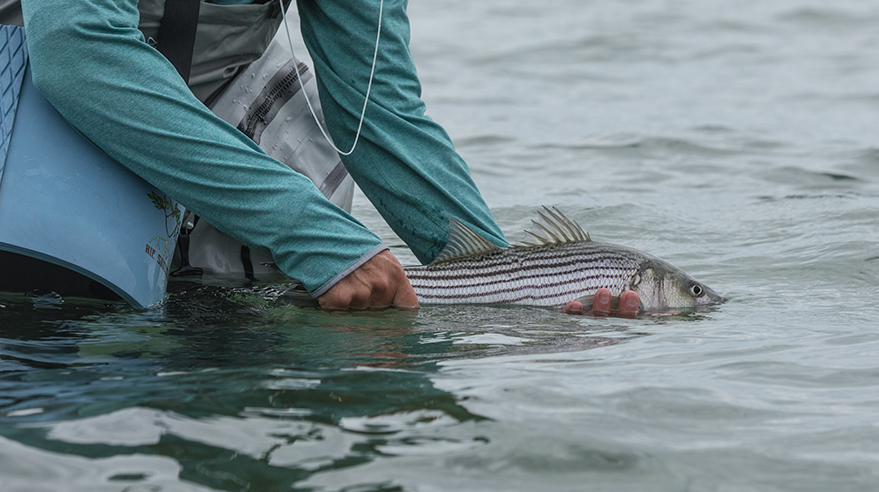Stripers On The Line: Quantifying short-term post-release activity, behavior, and mortality of striped bass (Morone saxatilis) in the Massachusetts recreational fishery
Principal Investigators
Andy Danylchuk, University of Massachusetts Amherst
Lucas Griffin, University of Massachusetts Amherst

Abstract
Globally, recreational fishing is an incredibly popular leisure activity that provides a wide range of economical and societal benefits. High participation rates equates to many fish being caught, however a greater portion of fish are returned to the water than harvested because of management regulations and voluntary actions that collectively aim to support sustainable recreational fisheries. Such is the case for the striped bass recreational fishery along the coast of Massachusetts where it is estimated that millions of striped bass are caught, handled, and released each year. Unfortunately, for those released, how fish are caught and handled can greatly impact the welfare and survival of fish. If mortality associated with catch and release exceeds sustainable levels for a recreational fishery, there may be detrimental impacts to the stock and for the coastal communities that depend on their economic contributions. To date, the science focused on estimating post-release behavior and mortality does not come close to encompassing the diversity of ways striped bass are caught in the recreational fishery, nor the range of habitats and conditions they are fished in.
The purpose of our study is to fill an important gap in knowledge about the fate of striped bass that are released in the recreational fishery in Massachusetts. We will quantify the short-term activity patterns, behavior, and mortality of striped bass across a range of angling techniques, environmental settings, and life history stages. To do so, we will use a two tiered rapid assessment approach that combines quantifying detailed metrics of angling events, indices of reflex impairment once striped bass are landed, and the use of triaxial accelerometer biologgers and tracking to assess short-term activity patterns and mortality following release. To access striped bass in the recreational fishery, we will use a ‘research angler’ approach that involves the direct collaboration with anglers and fishing guides. Our results will help hone release mortality estimates that are incorporated into stock assessments, as well as inform species-specific best practices for capture and handling that anglers can use to immediately reduce their impact on striped bass. Given the importance of the striped bass recreational fishery to the Commonwealth, our proposed research will contribute to more Sustainable Fisheries and Resilient Communities, especially as some commercial fisheries struggle. By working directly with anglers and fishing guides, and through partnerships with angling clubs and angler-based nonprofits, our efforts will also contribute to increased environmental literacy since the fate of striped bass stocks cannot be discussed in isolation from other environmental factors facing coastal marine ecosystems, such as climate change.
Updates/Reports
WHOI Sea Grant Newsletter: Recreational Anglers Get Hooked on Striped Bass Research
Publications
Project Information
Started: February 2022
Completed:
Funded under: NOAA Sea Grant biennial call for proposals
Relevant Links
